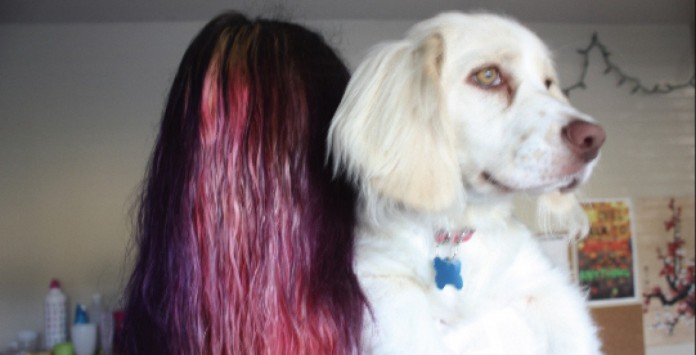Victoria Hungerford
Web Editor
As a graduating senior, I find myself more than just a little frightened with each passing day. Not because I do not want to leave the college lifestyle and enter into the real world, but rather the contrary. I am worried it will be impossible to embrace my individuality while at the same time making myself marketable for career placement.
Let me put this into another perspective: how many professors here have multi-colored hair? None. How many people at a doctor’s office display intense amounts of tattoos or body piercings? Probably the most you’ll see is a nose piercing. Growing up, did any of your teachers have unique markers on their body? Probably not. All were very mainstream, clean cut, and acceptable to Grandma Mae, down the street. This is why I am in a hard spot.
I will be graduating with a double degree in feminist studies and black studies. Both degrees have taught me to think critically about social institutions as well create my own theoretical framework for my understanding of the world. While I absolutely love my fields of study, as they both liberate me personally as well as educationally, these skills are not marketable skills in the real world. Neither is my pink and purple hair.
I embrace individuality and have found myself recently playing with hair color. My hair has gone from dark brown, to red, to black, to purple, to rainbow. Currently I am rocking pink and purple hair. But I’ve been told by countless people that when entering the market place I will have to conform, and thus change my hair color. Keep it “professional.”
Is this what I want? How is my physical appearance any reflection of my professional merits? I have worked in collaborative environments such as the KCSB Media center and The Bottom Line and have never felt any pressure to “look like others.” Rather, I have felt encouraged to embrace my individuality and bring my own perspective into my workplace.
Yet, it seems colorful hair and “alternative” appearances are often met with skepticism. Here is an example. I am a proud dog owner and a friend of the Santa Barbara Humane Society. I have never missed a puppy vaccination and have always been treated warmly until I dyed my hair.
Suddenly my responsibility as a dog guardian was put into question. I was bombarded with a million questions regarding whether or not my dog’s shots were up to date while in line to get my puppy spayed. They did not question the elderly couple in front of me dropping off their Labrador. I was questioned whether I understood the procedure my dog was about to undergo; if I knew the risks and whether I have de-wormed my six-month-old puppy. They left the mother behind me with her two children alone as she dropped off her dog.
I answered politely and explained to the best of my ability that I am a responsible pet guardian, I understood what was to happen, and why I was having my dog spayed. After leaving the clinic, I realized it was most likely due to my appearance that these women assumed I was an irresponsible pet guardian.
I have encountered similar situations when talking to other older individuals in the career field I would like to enter. However, when discussing career placement with individuals in my sister’s area of expertise, the tattoo and art gallery industry, I have only felt acceptance of my appearance and creative abilities. My hair was never an issue; instead, my resume and portfolio were the issue.
Shouldn’t career placement be based solely on my resume and portfolio, not on my physical appearance? While I continue to hunt and refuse to change my appearance, I find myself looking more closely at graduate school rather than career placement, knowing full well my hair color wouldn’t be a contributing factor to whether or not I am accepted.
Here at UCSB, are we prepared to enter the real world? Are we ready to get rid of our unique identities, and have we been fully prepared to conform to the hegemony we discuss and fight against?
Graduate school it is, where I can hide away in academia as long as I want until I see society is ready to accept a pink-headed individual in its cubicle walls.












Comments are closed.